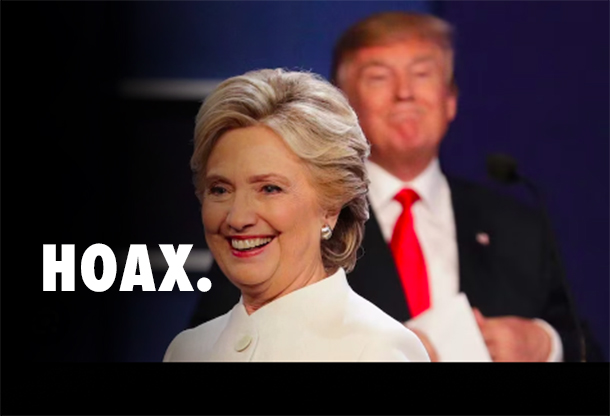from 21st Century Wire:

Techno Fog reports…
Yesterday, we highlighted some of the more important conclusions Special Counsel John Durham reached in his long-awaited report. Today, we do a deeper discussion into Durham’s findings.
And we start with what was omitted: the DNC “hack.”
The Barr Appointment Order and the DNC Hack
US Attorney John Durham was appointed by Attorney General Barr as Special Counsel in October 2020. The appointment order stated Durham was authorized to investigate the intelligence and law enforcement “directed at the 2016 presidential campaigns, individuals associated with those campaign, and individuals associated with the administration of President Donald J. Trump, including but not limited to Crossfire Hurricane and the investigation of Special Counsel Robert S. Mueller, III.”
TRUTH LIVES on at https://sgtreport.tv/
Initially, that appointment order got our attention because it mentioned the 2016 “campaigns”: Durham would be reviewing investigations “directed” at the Hillary Clinton campaign.
What investigations were those?
Contintue Techno Fog’s analysis at Substack
Susan Schmidt from Racket News report…
Special Counsel John Durham’s “Report on Matters Related to Intelligence Activities and Investigations Arising Out of the 2016 Presidential Campaigns” trickled out yesterday afternoon, hitting journalist inboxes just after 3:00 p.m. A quick read revealed the following key takeaways:
- There was no valid predicate for the investigation, and the FBI knew it.
From the report:
It is the Office’s assessment that the FBI discounted or willfully ignored material information that did not support the narrative of a collusive relationship between Trump and Russia. Similarly, the FBI Inspection Division Report says that the investigators “repeatedly ignore[d] or explain[ed] away evidence contrary to the theory the Trump campaign… had conspired with Russia… It appeared… there was a pattern of assuming nefarious intent.” An objective and honest assessment of these strands of information should have caused the FBI to question not only the predication for Crossfire Hurricane, but also to reflect on whether the FBI was being manipulated for political or other purposes. Unfortunately, it did not.
The entirety of the evidence the FBI used to launch its investigation of the Trump campaign is contained in what came to be known as “Paragraph Five,” because it ended up in that spot in a FISA warrant application on Trump volunteer Carter Page. The information in Paragraph Five came from Australian diplomat Alexander Downer, and was derived from an interaction he had at a London wine bar with young Trump foreign policy volunteer George Papadopoulos, ostensibly concerning Russia.
Australian diplomats told Durham that the impetus for passing the Paragraph Five info to the U.S. government in late July 2016 was the release of hacked DNC emails by Wikileaks. The entire case came down to an abstract of a diplomatic cable, quoted here in full:
Mr. Papadopoulos was, unsurprisingly, confident that Mr. Trump could win the election. He commented that the Clintons had “a lot of baggage” and suggested the Trump team had plenty of material to use in its campaign. He also suggested the Trump team had received some kind of suggestion from Russia that it could assist this process with the anonymous release of information during the campaign that would be damaging to Mrs. Clinton and President Obama. It was unclear whether he or the Russians were referring to material acquired publicly of sic through other means. It was also unclear how Mr. Trump’s team reacted to the offer.
On the strength of that tiny bit of information, the FBI opened full investigations into four Trump presidential campaign aides, seeking to determine whether they were “witting or and/or coordinating activities with the government of Russia.”
- “There’s nothing to this, but we have to run it to ground.”
As soon as the FBI received Paragraph Five, Counterintelligence chief Peter Strzok and a supervisory agent rushed to London, where they met with an FBI legal attaché (UKALAT) and interviewed diplomats at the Australian High Commission. In a taxi on the way to the interviews, Strzok reportedly said, “There’s nothing to this, but we have to run it to ground,” as the attaché later told the FBI’s inspection division.
One of the Australian diplomats told the FBI team that “the Paragraph Five information was written in an intentionally vague way because of what Papadopoulos did and did not say,” and, because of their uncertainty about what to make of it. The report says Downer told the FBI that Papadopoulos “simply stated, ‘The Russians have information…’ He made no mention of Clinton emails, dirt or any specific approach by the Russian government to the Trump campaign team with an offer or suggestion of providing assistance.”
British intelligence officials, the FBI attaché said, “could not believe the Papadopoulos bar conversation was all there was.”
- “It’s thin”; “There’s nothing to this.”
A message exchange on August 11, 2016 between the attaché and the supervisory agent shows the Americans were as skeptical as the British.
UKALAT-1: Dude, are we telling them [British Intelligence Service-I] everything we know, or is there more to this?
Supervisory Special Agent-1: That’s all we have.
Supervisory Special Agent-I: not holding anything back
UKALAT-1: Damn that’s thin
Supervisory Special Agent-I: I know
Supervisory Special Agent-I: it sucks
- The Trump campaign investigation was premised on “raw, unanalyzed and uncorroborated intelligence,” and U.S. intel agencies possessed no “actual evidence of collusion” when the probe began
According to Durham, the senior FBI officials who ordered the probe did not look at the Bureau’s intelligence databases, or consult its experienced Russia analysts, who could have told them they had seen no information about Donald Trump being involved with Russian leadership officials.
Read More @ 21stCenturyWire.com




